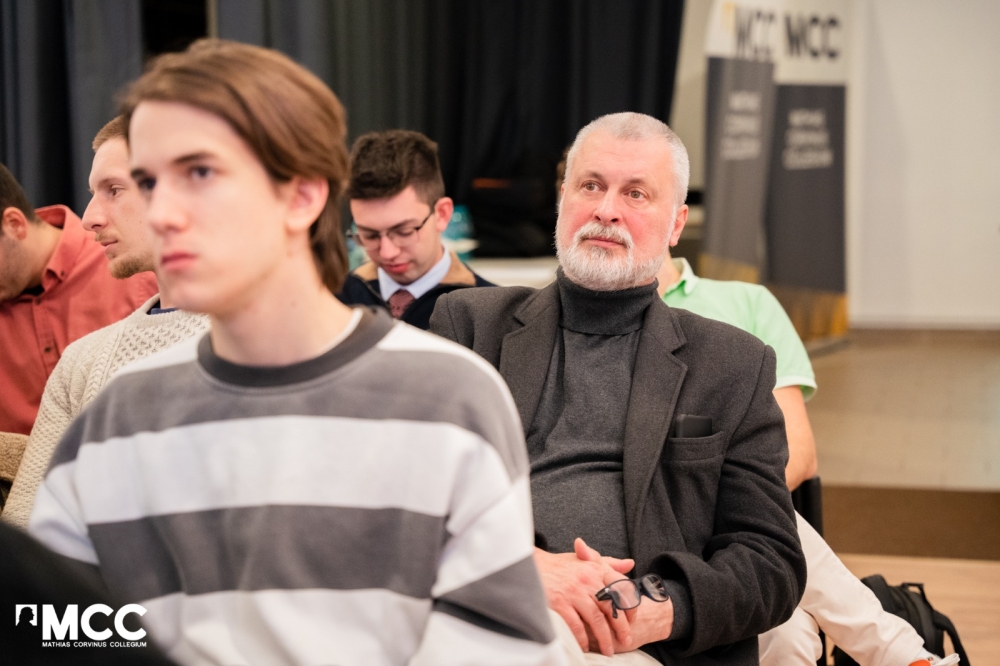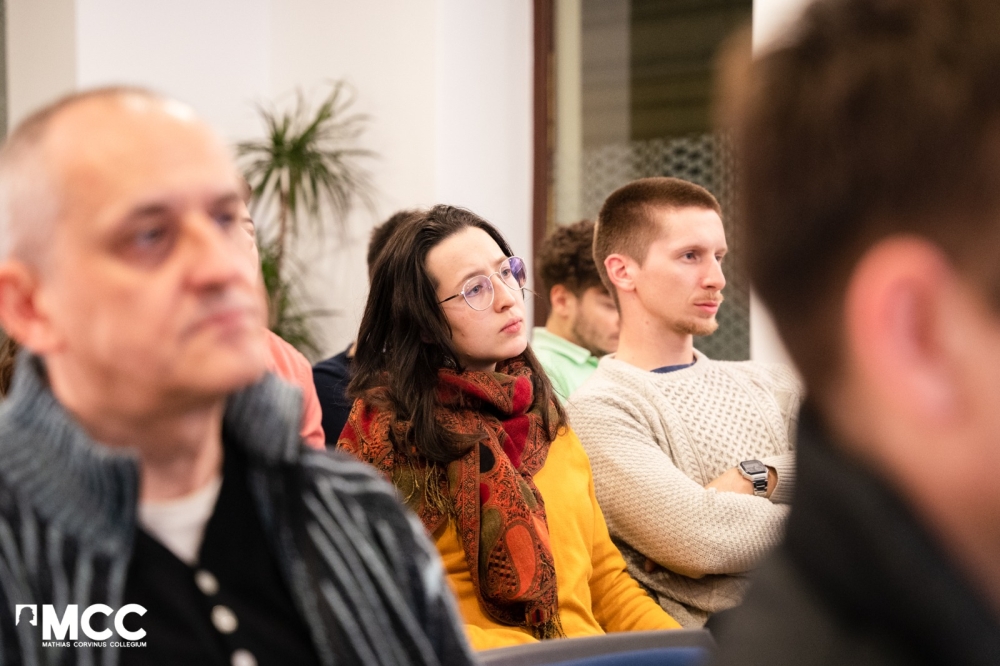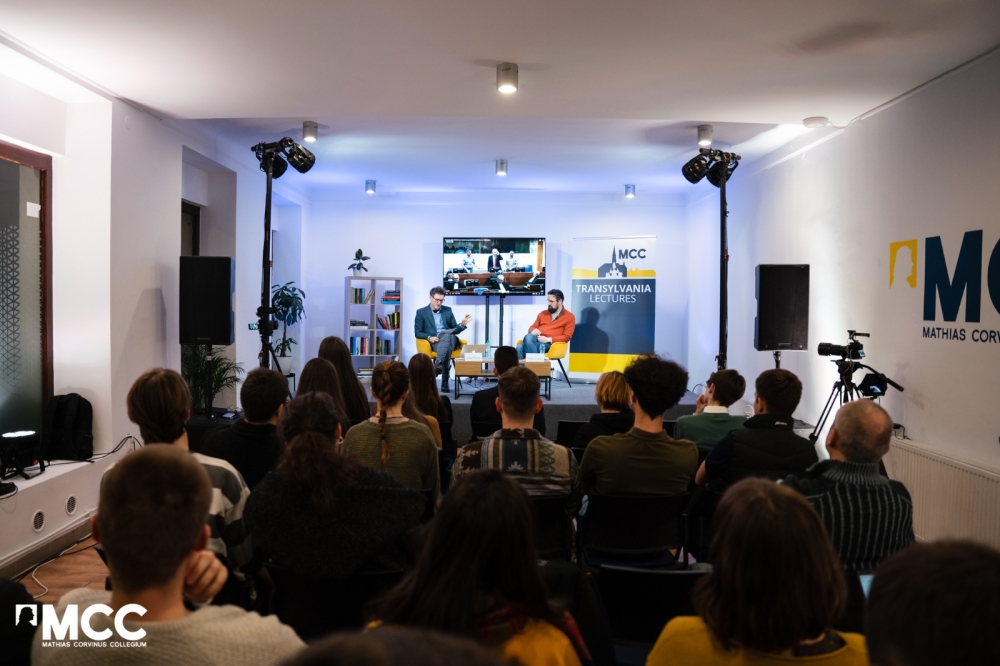Reading time: 5 minutes
At the latest open event of Mathias Corvinus Collegium’s (MCC) Transylvania Lectures series on the 9th of December at the MCC Center in Kolozsvár, former war correspondent Julius Strauss, MCC visiting fellow talked about what it is like to work on the frontline and the dilemmas and difficulties the war correspondent faces.
Julius Strauss talked about his own experiences as a war correspondent at the lecture titled "Journalists in bulletproof vests". Our guest has served as a war correspondent in major conflicts around the world for 15 years, as a Balkans correspondent for The Daily Telegraph from 1996 to 2000, in Sierra Leone, Afghanistan and Iraq from 2000 to 2004, and as a Moscow correspondent from 2002 to 2005. The event was opened by Daniel Rotaru, a student of the MCC's University Program, and was moderated by radio presenter Tiberiu Crișan.
Julius Strauss started with a strong story: in 1996, as a young journalist, he investigated the previous year’s Srebrenica massacre in Bosnia. He had no contacts, he didn't know much about the country, but he persevered in his quest for a new approach. After one of the bloodiest events of the Bosnian war, they still didn't know exactly what had happened or where were the bodies of the thousands of massacred Bosniaks. The young journalist began to make friends with Serbs until someone pointed him in the direction of a perpetrator. After several days of talking, the middle-aged Serbian man gave in: it turned out he had been present at the massacre. The journalist and his interpreter drove with the man over difficult terrain for a long time until they found hundreds of dead bodies on a mountainside. The perpetrator claimed with conviction that only soldiers had been killed, but apparently the deceased were civilians. This became Julius Strauss' first high-profile story.
The most serious incident he reported on was the 2004 hostage crisis in Beslan, where 186 children died in an occupied school. He travelled to the scene as Moscow bureau chief for The Daily Telegraph, where he found a dangerous stand-off: neither the Chechens nor the Russians would give in, and a shoot-out was expected. On the third day of the hostage crisis, only two journalists, Russian photographer Yuri Kozyrev and Julius Strauss, managed to get through the military security cordon, becoming eyewitnesses of the shooting and explosions. A fire broke out in the school and the collapsed ceiling killed and injured many children. Seeing the tragedy, he knew it was a turning point in his life, he had reached his personal limit and was about to make his last major report.
Asked by the moderator what war reporting is, Julius Strauss said that war correspondents don't like to be called that, because they don't just report on conflicts. "The more time you spend in this field, the less you want to talk about it," added the journalist, who said that curiosity, perseverance in difficult situations and good networking skills are necessary traits in the profession. People who become war correspondents are natural rebels, they stand out a bit, make their own decisions, follow their instincts and don't just seek the company of important people. "In the beginning, it's the adrenaline for a while, but in the long run, it's the sense of purpose that keeps you going," he said. In such situations, a journalist has to adapt to a wide variety of situations: dealing with grieving families, soldiers, victims, handling critical situations, researching everything (from passports to proper clothing to meals), finding ways to communicate, seeing through the logistics of reporting on the front. You need to talk to both sides with humility and fairness, and in most cases, if you approach the people involved with respect, interest and honesty, facts and stories will come out.
Julius Strauss also spoke openly about the mental trials of the profession. He believes that it is not a problem to be physically, mentally or emotionally injured in life, as our natural healing process helps us to deal with trauma. It is how we process difficult experiences that is important. "Pain and suffering are good teachers in life. No one wishes it, but we have to recognize its value," explained the speaker, who remains positive about humanity after seeing so much horror. In his work he has witnessed terrible things, but he has also seen the nobility in people: war brings out the best and the worst in human nature.
In 2006, the journalist moved to Canada, where he found peace in nature, set up the Wild Bear Lodge sanctuary, works as a wildlife activist and provides therapy possibilities to help war-affected people.
In the Transylvania Lectures series, the MCC invites renowned foreign experts to Kolozsvár to present their research and views in public lectures and engage in discussions with local community members. According to Botond Talpas, general director of MCC Transylvania, the monthly English-language talks are a good opportunity for people to get a glimpse into the life of the Collegium and to reflect on and discuss the major social, economic and political issues of our time. In previous lectures this academic year, MCC hosted Dr. Peter Boghssian, an American philosopher, and Shaun Riordan, a former British diplomat, who discussed social change, academic life, virtual embassies and artificial intelligence at these events.


